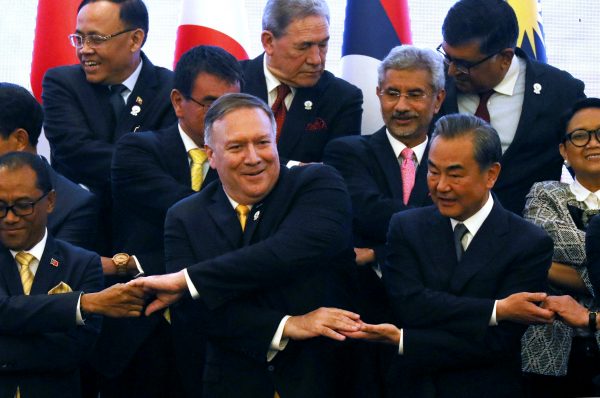The policies of the Obama White House were not guaranteed to work and neither was ASEAN assured of ongoing US interest in the regional association. But the dual track approach that emerged by 2016 — consisting of coherent policy and continued public engagement — did suggest a clear path forward.
Since 2016, things have taken a turn for the worst.
First, US President Donald Trump’s decision to withdraw from the Trans-Pacific Partnership shattered the coherent policy approach developed under Obama. Trump attended the 5th US–ASEAN Summit in Manila in 2017 and aired his vision for a free and open Indo-Pacific but policy to match this rhetoric has been lacking. Second, as the policy framework for US engagement with ASEAN fell apart, so did efforts to support ASEAN centrality and demonstrate ASEAN’s importance to the United States.
Trump skipped the 2018 and 2019 ASEAN–US meetings. US Vice President Mike Pence attended in 2018 and National Security Advisor Robert O’Brien in 2019 in moves widely seen as snubbing ASEAN leaders. The majority of ASEAN leaders declined to meet O’Brien, concerned that unless the meeting was between equals it would diminish their stature and mark their subservience. The position of US Ambassador to ASEAN remains unfilled since 2017.
The result has been a precipitous decline in how the United States is viewed in the region. The 2020 State of Southeast Asia Survey Report found that regional confidence in the United States is low. The United States is increasingly viewed as erratic and preoccupied with its own interests. China is now widely seen as the most influential strategic actor in the region and while China’s dominance is viewed with considerable concern, if ASEAN members were forced to take sides, almost half would choose China over the United States — including a majority in seven ASEAN member states.
All of this provides the context for the recent push for a new special summit, hosted by Trump. The special summit is intended as an ‘olive branch’, an attempt to reset the now dysfunctional relationship. There was confusion about whether ASEAN leaders would attend the new special summit. Initially, only Cambodia, Laos, Singapore, Thailand and Vietnam agreed that their leaders would attend. Since then, all except Malaysia and the Philippines have agreed. A delay of the summit, caused by the COVID-19 outbreak, gives opportunity to consider what is needed to first steady and then improve US–ASEAN relations.
For the United States, there is a danger of viewing the summit as a discrete investment of time rather than a marker of something more long term. The rush to repair the relationship may, if the summit is viewed by ASEAN members as a transactional exercise, damage the relationship even more. Trump may hope for a quick fix. But ASEAN meetings are less about ‘the deal’ and more a key way that ASEAN performs its unity and centrality. Participants mark their respect to the region, its leaders and ASEAN centrality by engaging over the long-term.
To ensure this second-track approach is maintained, three activities stand out, all of which sit alongside renewed policy engagement.
First, Trump should commit publicly to attending future US–ASEAN summits.
Second, the US–ASEAN special summits hosted by the United States should happen more regularly. An ongoing commitment to welcoming ASEAN leaders to the United States would reinforce the notion that Washington respects ASEAN.
Third, there should be consistent and public support for an ‘ASEAN-aware’ account of Indo-Pacific security. In a world where other ‘minilateral’ alternatives are proliferating, it is tempting to bypass ASEAN in the name of efficiency. There are criticisms to be made of ASEAN’s ineffectiveness but costs accrue if ASEAN is sidelined. How ASEAN fits into these alternate mechanisms and processes and how it can be made clear that these do not sideline ASEAN is a question for the United States and its allies to answer.
Working with ASEAN will always be complicated. ASEAN’s internal divisions mean it is difficult to see it ever becoming a proper US ally. ASEAN is also often unable to deliver on its many on-paper commitments. But ASEAN is not useless. As regional players, ASEAN and its members are evidence that the values ASEAN centrality promotes are not imposed by external states. This allows the United States and others to support indigenous efforts to produce regional policy rather than simply promoting their own ‘external’ standards against the wishes of local players.
This, above everything else, is the potential benefit of working with ASEAN. Realising this benefit is not just a matter of new policies but requires ongoing displays of engagement and patience. These are not hallmarks of the current US approach to the region. To repair the damage done to this relationship, these skills need to be rediscovered quickly.
Mathew Davies is Head of the Department of International Relations at the Coral Bell School of Asia-Pacific Affairs, The Australian National University.

